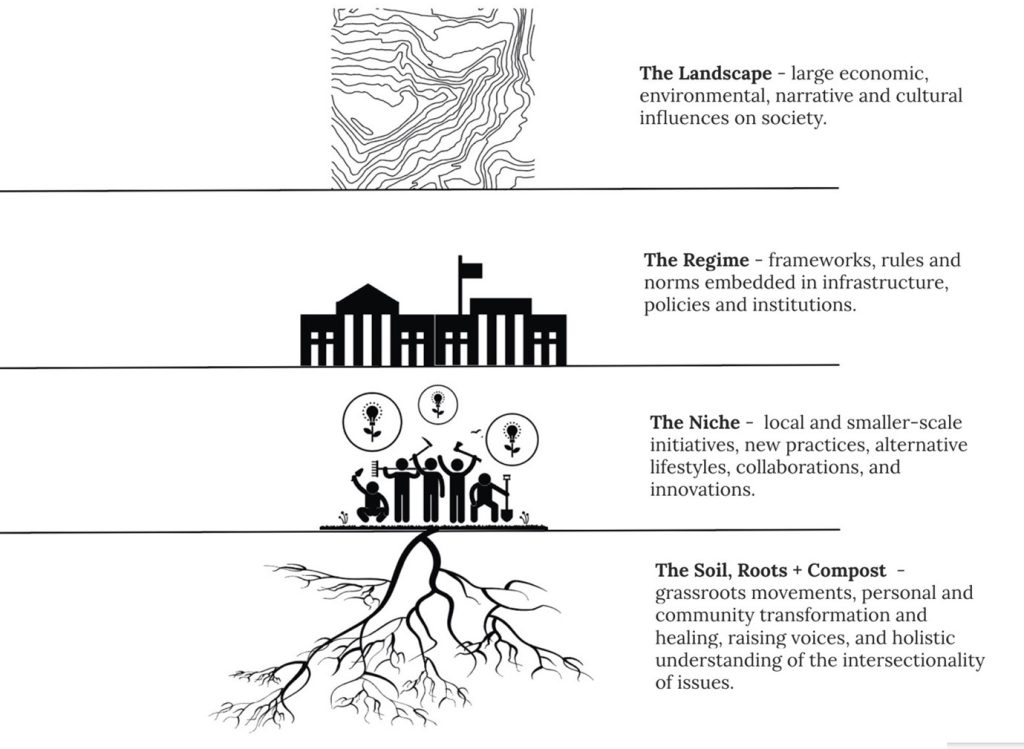The Growing Great Ideas Fund from the National Lottery Community Fund offers long term, multi-year funding to initiatives with the potential to achieve transformative, longer-term change.
Last month we announced the first recipients of Growing Great Ideas (GGI) grants. This was a funding programme designed to provide significant, long-term funding (over a period of up to ten years) to organisations working closely within their networks and ecosystems to build generative, transformative infrastructure for the public good. This is infrastructure to support a transition from now to next.
The context for this funding programme
As the UK begins to emerge from the pandemic, there have been a number of government papers and policy announcements that together paint a picture of what ‘building back better’ means.
From levelling up, to community renewal; from the green revolution to community ownership, this is a vision of a country brought back to life through the creation of extensive green infrastructure, skills and jobs. There are policy commitments to public green spaces; the promotion of more active travel; greater access to clean air and nature. All of this is couched in a desire for people to feel real pride in the place that they live, and enjoy a sense of connection and community that means they choose to live, work and play locally. Funds are being made available by the government to support areas wishing to experiment with new approaches to community renewal and ownership, to instil a sense of pride in who we are, where we live and what we can accomplish together.
Taken together, these commitments are full of potential. However, the scale of the challenge cannot be underestimated: Inequality is rising, insecurity is intensifying, climate and ecological breakdown are looming, and polarisation is an abiding feature of our democracy. There is broad consensus that these crises will not be solved by tinkering with existing systems. A deeper transformation is required.
As a funder, we have a critical role to play in investing in this transformation, rather than simply alleviating the worst effects of the challenges as they show up in local communities up and down the country. This is the context in which we designed the Growing Great Ideas Fund.
Systems innovation and innovative funding
This funding programme recognises that in the light of the social and environmental challenges we are facing, we need to invest long-term in the groups and networks who are going beyond redesigning current systems and services (e.g. of care, of housing, of land ownership, to name a few), and are instead trying to rewrite the script around systems of ownership, power and value. Those who are offering a new vision of what ‘normal’ could look like.

Diagram from the Systems Innovation Green Paper, 2020
The pandemic has made the need for this kind of systemic work more visible. The initiatives in this programme eschew the idea of ‘going back to normal’ and instead offer a new vision of what ‘normal’ could look like. They show new ways of organising, new ways of creating value, and new logic models for economic value and social systems. The initiatives in this programme are creating generative social infrastructure to support a transition from now to next, and through which many other things are made possible. To support the significant government investment in physical infrastructure, this funding programme invests in social and civic infrastructure for patient, long-term social renewal.
Recognising that system shifts require intentional work at multiple levels we used the Power Shift Framework (Fraser and Glass 2020), an adapted version of Geels et al’s Socio-technical Transitions Theory, and are looking for initiatives that operate in at least two of these four layers.

Whilst all the initiatives we’ve initially invested in will contribute to stronger and thriving communities, they won’t all be things that communities know they need or would directly ask for. Much of what these initiatives are doing might currently be unimaginable by the general public.
This was a shift away from some of our other grantmaking and we spent 9 months taking the Funding Committee on a journey. We shared the table below, which summarises how the programme looks and feels different to other funding programmes:
| Within existing, established paradigms | Seeds of emerging possible futures |
| Clearly defined interventions | Working at multiple levels of the system |
| Focus on sustaining organisational growth/service development | Focus on field building, networks and social infrastructure |
| Measurable data is related to service output | Measurable data is related to system vitality |
| Guided by metrics and data | Guided by ethos and relationships |
| Reinforcing existing narratives | Experimenting with new narratives |
| Comfortable and recognisable | Unfamiliar and sometimes uncomfortable |
| Proving impact against a defined theory of change | Continuous learning and adaptation towards the defined outcome |
| Cost benefit analysis centred on cashable savings | Full appraisal of social, environmental and economic value |
| Value and learning is accrued to a single organisation | Value and learning is shared generously |
There will be significant learning from this funding programme, both for the Fund and the wider sector. To leverage the investment of public money we need to catalyse and strengthen work across the whole ecosystem of grants, and into a much broader set of benefits across communities and society. That includes being thoughtful about how we conceive of evidencing progress and supporting the grantees to learn and adapt as the work deepens and grows.
We’ve intentionally avoided the use of the word ‘impact’ – instead looking at more appropriate ways to consider and document value in emergent and complex work. Just as you don’t measure the impact of a road by what it does but by what it enables, so too will we need to measure the impact of these investments not only by the immediate activities they undertake but by what the infrastructure they create enables at both a local and societal level. We’ll share more of this as we go, but have been using this series of open events to discuss this idea.
In the first cohort of grantholders are ecosystems of work that are finding emergent, creative, relational ways of dealing with some of the biggest challenges our society faces — from racial injustice, to industrial farming, to an economic system no longer fit for purpose, and beyond. Ultimately, the contribution of this ecosystem is to bring an emerging future to life; it is an invitation to live and work according to a different paradigm, underpinned by different values. A series of blogs outlines the dreams, ambitions and long-term vision of each of these projects, which we funded £5 Million each over 10 years:
- Transition Network
- Slow Ways
- CIVIC SQUARE
- The Doughnut Economics Action Lab
- Open Systems Lab
- Farming the Future
- Down to Earth Project
- Black Thrive Global
- Healing Justice London
The work each of these initiatives is doing gives me hope. They attract people to them because they are different, because they are asking new and better questions, and because they are working in ways that recognise interdependence.
‘The work of building a better future is profoundly different now than it was even a few decades ago. … In this new era, the strategies that can seize opportunities and produce change are different. The sets of skills and insights needed to develop and execute those strategies are different. …Even the kind of conversations we have with those closest to our hearts — about our plans, hopes and dreams — are changing as we come to accept our changed realities.’ — Alex Steffen
We need more of what all these initiatives are doing, and as a funder it’s not just about investing in these alternatives — it’s also about creating the conditions through which many more of them can be seeded and grow. This is field-building for the third horizon.
Cassie Robinson is the Deputy Director of Funding Strategy at The National Lottery Community Fund.



Comments (0)